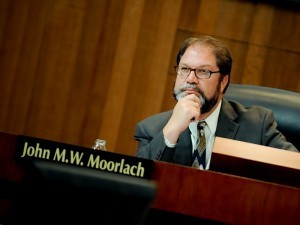Eight years ago, then-Orange County Register reporter Norberto Santana opened his piece, “The Art of the O.C. Deal (Orange County Register, August 6, 2006),” with the following observation: “When people see the board of supervisors vote on a labor deal, what they don’t know is that most often, an agreement has already been reached in private. And it’s perfectly legal.”
The root cause of fiscal distress for many municipalities is the negotiated bargaining unit agreements. The promise of future benefits could not feasibly be paid. And most officials would have told you so if they were asked about the sustainability of the deal points. But when the public is not aware of the contract details until after they are agreed to, it is too late.
Shouldn’t the experience of this obvious flaw in the process give those who come after a strong reason to open the negotiation process? Yes, it should.
No Real Say
Can you imagine a private-sector business allowing a third party to negotiate contracts on its behalf with no say in the process? Of course not. Yet, when dealing with labor negotiations, the general public, whose tax money is being spent, allow their elected officials to negotiate without any real say in the process.
As a county supervisor, one of the most serious responsibilities that I have been entrusted with is negotiating with employee organizations representing more than 17,000 county employees. To put this in context, salary and employee benefits represent 35.2 percent of the county’s $5.4 billion budget.
These negotiations, which happen behind closed doors, are shrouded in secrecy, with the general public only being able to give input after a deal is already agreed upon. For this reason, I have introduced the Civic Openness in Negotiations (COIN) ordinance for consideration by the Orange County Board of Supervisors. The idea is not new. It was first adopted by the city of Costa Mesa.
Five Important Parts
The ordinance has five main components:
- Independent Negotiator – As is current policy, the county will hire an independent negotiator who is not impacted by any outcome in the negotiation process. Past practice had county staff, who were subject to the same provisions as the bargaining unit they were negotiating with, negotiate on behalf of the Board of Supervisors. Independent negotiators remove this conflict.
- Cost of Contracts – Current practice has the county budget office analyze the costs of any contract proposal. Under COIN, the independently elected Auditor-Controller will take on this responsibility. This ensures an equal playing ground for both labor organizations and the county, as both will be given the ability to comment about the analysis.
- Offers and Counteroffers – This ordinance would require that all offers and counteroffers be disclosed to the public within 24 hours.
- Board Disclosure – Each member of the Board of Supervisors will be required to disclose any and all verbal, written, or electronic communications they have had with an official representative of a recognized employee organization.
- Contract Approval – This ordinance will require that, before the final proposed contract is placed on the Board agenda, the Memorandum of Understanding will be posted to the County Web site.
This ordinance is intended to not only make the negotiation process more transparent, but to allow the public to hold elected officials accountable for the actions they take in regard to taxpayer funds.
We universally agree on transparency and scrutiny. By implementing COIN, the negotiation process will improve for all the impacted parties.
John M. W. Moorlach ([email protected]) is a Republican member of the Orange County, Calif., Board of Supervisors. Used with permission of UnionWatch.org, a project of the California Policy Center.




